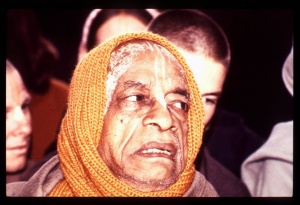CC Adi 16.44 (1975): Difference between revisions
(Vanibot #0027: CCMirror - Mirror CC's 1996 edition to form a basis for 1975) |
(Vanibot #0020: VersionCompareLinker - added a link to the Version Compare feature) |
||
| Line 2: | Line 2: | ||
<div style="float:left">'''[[Sri Caitanya-caritamrta (1975)|Śrī Caitanya-caritāmṛta (1975)]] - [[CC Adi (1975)|Ādi-līlā]] - [[CC Adi 16 (1975)|Chapter 16: The Pastimes of the Lord in His Childhood and Youth]]'''</div> | <div style="float:left">'''[[Sri Caitanya-caritamrta (1975)|Śrī Caitanya-caritāmṛta (1975)]] - [[CC Adi (1975)|Ādi-līlā]] - [[CC Adi 16 (1975)|Chapter 16: The Pastimes of the Lord in His Childhood and Youth]]'''</div> | ||
<div style="float:right">[[File:Go-previous.png|link=CC Adi 16.43 (1975)|Ādi-līlā 16.43]] '''[[CC Adi 16.43 (1975)|Ādi-līlā 16.43]] - [[CC Adi 16.45 (1975)|Ādi-līlā 16.45]]''' [[File:Go-next.png|link=CC Adi 16.45 (1975)|Ādi-līlā 16.45]]</div> | <div style="float:right">[[File:Go-previous.png|link=CC Adi 16.43 (1975)|Ādi-līlā 16.43]] '''[[CC Adi 16.43 (1975)|Ādi-līlā 16.43]] - [[CC Adi 16.45 (1975)|Ādi-līlā 16.45]]''' [[File:Go-next.png|link=CC Adi 16.45 (1975)|Ādi-līlā 16.45]]</div> | ||
{{CompareVersions|CC|Adi 16.44|CC 1975|CC 1996}} | |||
{{RandomImage}} | {{RandomImage}} | ||
==== TEXT 44 ==== | ==== TEXT 44 ==== | ||
<div class="verse"> | <div class="verse"> | ||
:prabhu kahe, devera vare | :prabhu kahe, devera vare tumi--'kavi-vara' | ||
:aiche devera vare keho haya | :aiche devera vare keho haya 'śrutidhara' | ||
</div> | </div> | ||
| Line 25: | Line 24: | ||
<div class="translation"> | <div class="translation"> | ||
The Lord replied, | The Lord replied, "By the grace of the Lord someone may become a great poet, and similarly by His grace someone else may become a great śruti-dhara who can memorize anything immediately." | ||
</div> | </div> | ||
| Line 32: | Line 31: | ||
<div class="purport"> | <div class="purport"> | ||
In this connection, śruti-dhara is a very important word. Śruti means | In this connection, śruti-dhara is a very important word. Śruti means "hearing" and dhara means "one who can capture." Formerly, before the beginning of Kali-yuga, almost everyone, especially among the intelligent men, the brahmaṇas, was a śruti-dhara. As soon as a student heard any of the Vedic wisdom from his master, he would remember it forever. There was no need to refer to books, and therefore there were no written books in those days. The spiritual master delivered the Vedic hymns and their explanations to the student, who would then remember them forever, without consulting books. | ||
To become a śruti-dhara, one who can remember simply by hearing, is a great achievement for a student. In the Bhagavad-gītā ([[BG 10.41 (1972)|Bg. 10.41]]) the Lord says: | |||
:yad yad vibhūtimat sattvaṁ | |||
:śrīmad ūrjitam eva vā | |||
:tat tad evāvagaccha tvaṁ | |||
:mama tejo-'ṁśa-sambhavam | |||
"Know that all opulent, beautiful and glorious creations spring from but a spark of My splendor." ([[BG 10.41 (1972)|Bg. 10.41]]) | |||
As soon as we find anything extraordinary, we should understand that such an extraordinary manifestation is the special grace of the Supreme Personality of Godhead. Therefore Lord Caitanya Mahāprabhu replied to the champion, Keśava Kāśmīrī, that just as he was greatly proud of being a favorite devotee of mother Sarasvatī, so someone else, like He Himself, being favored by the Supreme Personality of Godhead, could become a śruti-dhara and thus memorize anything immediately simply by hearing it. | |||
As soon as we find anything extraordinary, we should understand that such an extraordinary manifestation is the special grace of the Supreme Personality of Godhead. Therefore Lord Caitanya Mahāprabhu replied to the champion, Keśava Kāśmīrī, that just as he was greatly proud of being a favorite devotee of mother Sarasvatī, so someone else, like | |||
</div> | </div> | ||
Latest revision as of 15:45, 26 January 2020

A.C. Bhaktivedanta Swami Prabhupada
TEXT 44
- prabhu kahe, devera vare tumi--'kavi-vara'
- aiche devera vare keho haya 'śrutidhara'
SYNONYMS
prabhu—the Lord; kahe—replied; devera—of a superior power; vare—by benediction; tumi—you; kavi-vara—the most elevated poet; aiche—similarly; devera—of the Lord; vare—by the benediction; keho—someone; haya—becomes; śruti-dhara—one who can immediately remember.
TRANSLATION
The Lord replied, "By the grace of the Lord someone may become a great poet, and similarly by His grace someone else may become a great śruti-dhara who can memorize anything immediately."
PURPORT
In this connection, śruti-dhara is a very important word. Śruti means "hearing" and dhara means "one who can capture." Formerly, before the beginning of Kali-yuga, almost everyone, especially among the intelligent men, the brahmaṇas, was a śruti-dhara. As soon as a student heard any of the Vedic wisdom from his master, he would remember it forever. There was no need to refer to books, and therefore there were no written books in those days. The spiritual master delivered the Vedic hymns and their explanations to the student, who would then remember them forever, without consulting books.
To become a śruti-dhara, one who can remember simply by hearing, is a great achievement for a student. In the Bhagavad-gītā (Bg. 10.41) the Lord says:
- yad yad vibhūtimat sattvaṁ
- śrīmad ūrjitam eva vā
- tat tad evāvagaccha tvaṁ
- mama tejo-'ṁśa-sambhavam
"Know that all opulent, beautiful and glorious creations spring from but a spark of My splendor." (Bg. 10.41)
As soon as we find anything extraordinary, we should understand that such an extraordinary manifestation is the special grace of the Supreme Personality of Godhead. Therefore Lord Caitanya Mahāprabhu replied to the champion, Keśava Kāśmīrī, that just as he was greatly proud of being a favorite devotee of mother Sarasvatī, so someone else, like He Himself, being favored by the Supreme Personality of Godhead, could become a śruti-dhara and thus memorize anything immediately simply by hearing it.